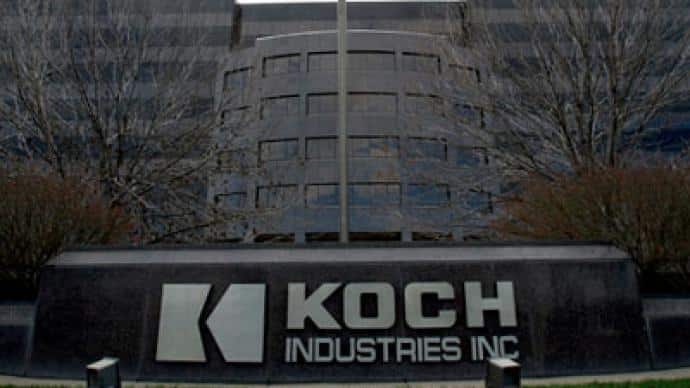
While many American companies have fled from doing business in Russia as media and politicians have built up the message of hate against the country, Koch Industries has continued to pursue commerce in Russia.
The backlash against Koch Industries has been huge. The advocates for greater antagonism toward Russia have portrayed the private company’s decision to continue engaging in commerce for mutual benefit as an inexcusable divergence by a prominent company. Koch Industries, by taking the routine profit-seeking, wealth-building course of a company, is inhibiting the promotion of an anti-Russia zeitgeist. If Koch Industries can keep American-Russian commerce alive, even in a relatively small way, the propagandists worry that other companies may start to reopen their Russian commerce as well and that individuals may start to wonder what the harm is in dealing with Russians as friends instead of as enemies.
So strong is the backlash against Koch Industries that the company is heralding at the top of the “news” page of its website a collection of company announcements titled “Koch Responds: The Crisis in Ukraine” as a public relations response. The earliest of the three announcements in the collection is a March 16 statement by Koch Industries President and Chief Operating Officer Dave Robertson. Robertson’s statement begins with an expression, on behalf of the company, of disapproval of Russia invading Ukraine. Robertson then proceeds in the statement to discuss Koch Industries’ actions to aid its employees in Ukraine and other individuals harmed by the Russia-Ukraine war. Then Robertson discusses Koch Industries’ decision not to join the stampede of businesses cutting off commerce with Russia. While noting that the company is complying with “all applicable sanctions, laws and regulations governing our relationships and transactions within all countries where we operate,” Robertson states:
Koch company Guardian Industries operates two glass manufacturing facilities in Russia that employ about 600 people. We have no other physical assets in Russia, and outside of Guardian, employ 15 individuals in the country. While Guardian’s business in Russia is a very small part of Koch, we will not walk away from our employees there or hand over these manufacturing facilities to the Russian government so it can operate and benefit from them (which is what The Wall Street Journal has reported they would do). Doing so would only put our employees there at greater risk and do more harm than good.
Well said. Demands to end commerce tend to be, as is the case with the demands for American businesses to shut down operations in Russia, demands for the abandonment of the businesses’ productive operations and the reducing of the wealth and well-being of people just trying to make their way in the world, such as the employees at Koch Industries’ glass manufacturing facilities in Russia.
But, the relentless propagandists seeking to demonize all things Russian cannot stomach the resistance of even one company. There is no room for dissent, in their view. Koch Industries, they demand, must be punished for not joining 100 percent in the cause.
Among the more recent attacks on Koch Industries for the company’s refusal to pledge full allegiance to the hate Russia propaganda campaign is a The Hill editorial last week by prominent economist Laurence J. Kotlikoff. In his editorial, Kotlikoff calls for a boycott of a widely-used Koch Industries product. Kotlikoff writes:
But here’s my favorite proposal. We should all immediately stop buying Brawny paper towels. These are produced by Koch Industries, which is arguably the most prominent American company continuing to do business in Russia. If sales of Brawny paper towels plummet overnight, it will signal to all companies still operating in Russia that they too will face boycotts unless they pull out immediately. Indeed, Germany will get the message that Americans can quickly move from boycotting paper towels to boycotting German cars if they continue providing Putin with blood money.
As is made clear by Kotlikoff, while Koch Industries, as a prominent business continuing to engage in Russia-related commerce, is chosen as a target early on, the real goal is the termination of business dealings in Russia and with Russians by each and every American company and even by companies of other countries, such as Germany.
If Koch Industries holds out against the propagandists’ pressure, it can serve as an inspiration for other companies to continue doing or return to doing what businesses are meant to do — engage in commerce for mutual benefit.
If Koch Industries, instead, folds under the pressure of boycotts or other tactics, then wealth and well-being will suffer yet more in Russia, America, and beyond. The diminishing of commerce among countries would also further sever mutually-beneficial ties that act as barriers to hostilities, including war, between the United States and Russia.
Whose vision will win out in this conflict — the Koch Industries vision in favor of commerce in pursuit of mutual benefit or the counter-vision in favor of severing beneficial ties with Russia and building hate directed at Russia? It is not just Koch Industries’ continued operation of its facilities in Russia that is at risk in this conflict. Wealth, well-being, and peace are also at risk.

